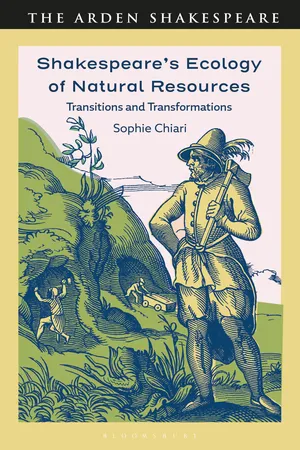
- English
- ePUB (mobile friendly)
- Available on iOS & Android
eBook - ePub
About this book
Sophie Chiari analyzes how Shakespeare's plays and poems present the transformation of the early modern natural world through environmental shifts and new ecological issues.
Using a range of examples from the Sonnets, Love's Labour's Lost, Hamlet, Timon of Athens and The Tempest, Chiari's ecopoeticstudy of dramatic language explores Shakespeare's response tothe rise of extractive exploitation in Elizabethan and JacobeanEngland. Chiari expands our understanding of the environment inShakespeare beyond the so-called 'green' comedies by charting thetransition from a pre-capitalist world towards a commodity-basedsociety characterized by the enclosure of the commons and the riseof imperialism. This study uses examples of materials which arecurrently underrepresented in Shakespearean ecocriticism includingwater systems, sandscapes and soil alongside the production ofglass and salt in Shakespeare, signalling a commitment to expanding the 'material turn' in Shakespeare studies.
Far from being limited to a presentist reading, this book argues that cultural hegemony and the exploitation of soil, ore and water were increasingly linked in the early modern era, an age of conquest and massive human depredation. By articulating ecohistoricism with ecopoetics and material studies, Shakespeare's Ecology of NaturalResources shows how an eco-minded approach, focused on the interweaving of trade, territory and extractivism, reveals new layers of meaning in Shakespearean poetics and drama.
Using a range of examples from the Sonnets, Love's Labour's Lost, Hamlet, Timon of Athens and The Tempest, Chiari's ecopoeticstudy of dramatic language explores Shakespeare's response tothe rise of extractive exploitation in Elizabethan and JacobeanEngland. Chiari expands our understanding of the environment inShakespeare beyond the so-called 'green' comedies by charting thetransition from a pre-capitalist world towards a commodity-basedsociety characterized by the enclosure of the commons and the riseof imperialism. This study uses examples of materials which arecurrently underrepresented in Shakespearean ecocriticism includingwater systems, sandscapes and soil alongside the production ofglass and salt in Shakespeare, signalling a commitment to expanding the 'material turn' in Shakespeare studies.
Far from being limited to a presentist reading, this book argues that cultural hegemony and the exploitation of soil, ore and water were increasingly linked in the early modern era, an age of conquest and massive human depredation. By articulating ecohistoricism with ecopoetics and material studies, Shakespeare's Ecology of NaturalResources shows how an eco-minded approach, focused on the interweaving of trade, territory and extractivism, reveals new layers of meaning in Shakespearean poetics and drama.
Frequently asked questions
Yes, you can cancel anytime from the Subscription tab in your account settings on the Perlego website. Your subscription will stay active until the end of your current billing period. Learn how to cancel your subscription.
No, books cannot be downloaded as external files, such as PDFs, for use outside of Perlego. However, you can download books within the Perlego app for offline reading on mobile or tablet. Learn more here.
Perlego offers two plans: Essential and Complete
- Essential is ideal for learners and professionals who enjoy exploring a wide range of subjects. Access the Essential Library with 800,000+ trusted titles and best-sellers across business, personal growth, and the humanities. Includes unlimited reading time and Standard Read Aloud voice.
- Complete: Perfect for advanced learners and researchers needing full, unrestricted access. Unlock 1.4M+ books across hundreds of subjects, including academic and specialized titles. The Complete Plan also includes advanced features like Premium Read Aloud and Research Assistant.
We are an online textbook subscription service, where you can get access to an entire online library for less than the price of a single book per month. With over 1 million books across 1000+ topics, we’ve got you covered! Learn more here.
Look out for the read-aloud symbol on your next book to see if you can listen to it. The read-aloud tool reads text aloud for you, highlighting the text as it is being read. You can pause it, speed it up and slow it down. Learn more here.
Yes! You can use the Perlego app on both iOS or Android devices to read anytime, anywhere — even offline. Perfect for commutes or when you’re on the go.
Please note we cannot support devices running on iOS 13 and Android 7 or earlier. Learn more about using the app.
Please note we cannot support devices running on iOS 13 and Android 7 or earlier. Learn more about using the app.
Yes, you can access Shakespeare’s Ecology of Natural Resources by Sophie Chiari in PDF and/or ePUB format, as well as other popular books in Literatura & Crítica literaria de Shakespeare. We have over one million books available in our catalogue for you to explore.
Information
Table of contents
- Cover
- Halftitle Page
- Title Page
- Contents
- Illustrations
- Acknowledgements
- Introduction
- 1 The fabric of life in the Sonnets
- 2 Crossing the nature/culture divide in Love’s Labour’s Lost
- 3 Water industry and riverine collapse
- 4 From early modern sandscapes to the making of glass
- 5 Underground Shakespeare: transgressing the limits and foraging the earth
- 6 Plotting, digging, burying and soil issues in Hamlet
- 7 Business in the frost in The Tempest
- 8 White ecology: the salt of early modern life
- Conclusion
- Notes
- Bibliography
- Index
- Imprint